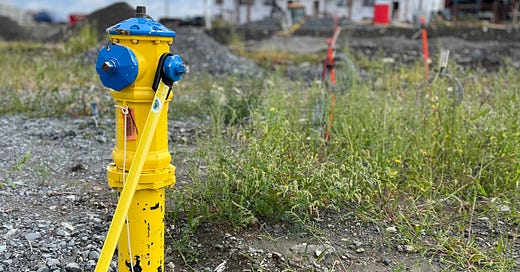Fix City Finances 9: Stop the Sprawl to Save the Budget
If your city is struggling with the basics, it's because sprawl is eating up more and more of the budget.
Fewer and fewer North American cities seem to be doing a good job delivering the basics expected of a municipal government.
Emptying trash cans in parks. Filling potholes in the roads. Ambulances available in an emergency.
Not the complex stuff, like a reliable public transit system. Or housing that people can afford.
Just the basics.
Cities are failing on the providing these core services for a simple reason.
Urban sprawl is quietly eating up city budgets.
Building infrastructure is expensive
Building roads and sewers out to new communities on the edge of town is expensive.
Most Canadian municipalities require new communities to pay for the cost of growth through up-front development charges. DCs are meant to cover these infrastructure costs, as well as the police, libraries, parks, public transit and other services required for a new community.
About half of US states have an equivalent development impact fee.
That is what city planners mean when they say “growth pays for growth”.
The only problem is that “growth pays for growth” is not true.
We’ve spent a lot of time looking at the finances of our home town, Ottawa. A recent DC Background Study shed a lot of light on the state of city finances, and the broader problem across North America.
Below is a link to the full analysis of that Background Study, and how suburban growth is actually subsidized through the development charges collected on infill growth. Under the Ontario development rules, it can be done through designating something a “City-wide project”, even if it is painfully obvious that the project benefits accrue overwhelmingly to a specific suburban neighbourhood.
Maintaining infrastructure is expensive
Up-front development charges are calibrated to pay for the initial costs of building infrastructure. But they do not cover the life cycle costs of maintaining or fixing that infrastructure.
Roads need to be maintained. They need to be ripped out and repaved every generation or so.
Water and sewage pipes last longer. But within a few generations they too need to be replaced.
Those infrastructure maintenance charges fall back on all tax payers.
The City of Toronto did a recent analysis on the state of its infrastructure. Toronto already earmarks a share of future taxes to pay for infrastructure renewal. But Toronto found it has a $26 billion deficit over the next ten years in paying for the renewal of decisions made twenty, forty or even sixty years ago.
Toronto can’t empty the overflowing trash cans because it has to focus its limited tax dollars on fixing crumbling infrastructure.
And Toronto is looking at a significant tax increase to pay for past decisions.
This is a historical problem. But it is also a future problem.
As the Toronto Star reported,
“Mayor Olivia Chow says the numbers, contained in a report going to her executive committee next week, are so staggering that the city needs to think twice about building anything new.”
Every new kilometre of road and water pipes that we build today represents a tax increase for the next generation.
Servicing spread out communities is expensive
Not surprisingly, it costs more to provide services to spread out communities. Whether it is snow removal, or collecting garbage, or having emergency services on call, we effectively pay by the metre. The further service vehicles need to drive, the greater the cost.
The City of Ottawa did a much-cited study that every new suburban home requires an operating subsidy of $465 per person per year. In contrast, each new infill home creates an operating surplus of $606 per person per year.
In other words, all existing taxpayers are subsidizing each new home built in a greenfield subdivision.
In the case of the City of Ottawa, there is a 10 year target to build 150,000 homes.
If those were all built as new suburban homes, and using the City’s planning figure of 2.3 people per suburban home, there would be an additional 345,000 people living in new sub-divisions at the edge of town.
That would amount to existing taxpayers providing a $160 million subsidy each year to service those new homes. For existing taxpayers in Ottawa, that is equivalent to an 8% increase in property taxes.
No wonder cities are trimming spending on the basics. Urban sprawl is swallowing up the budgets of cities.
A nod to Strong Towns
To learn more about the full cost of suburban sprawl, we recommend you dig into the Strong Towns movement.
Chuck Marohn and his team have done more than anyone to highlight the city budgeting issues resulting from sprawl. They consider that suburban sprawl is the Ponzi scheme of municipal finance.
Suburban sprawl is eating up your city’s budget. And it’s financially unsustainable. It locks in significant future property tax increases.
And turning to today. If you want your city to get back to fixing the basics, the first step is to stop the sprawl.







